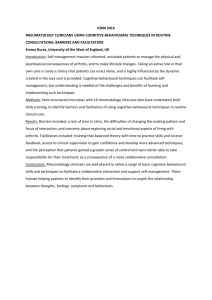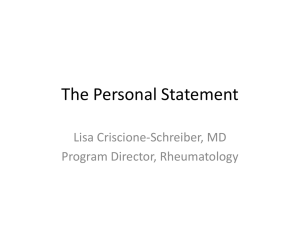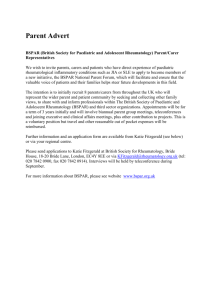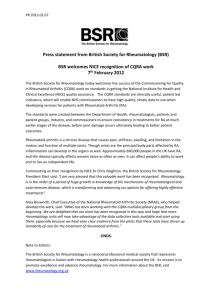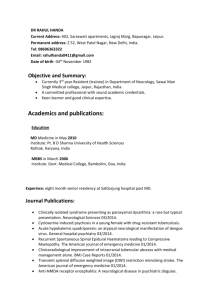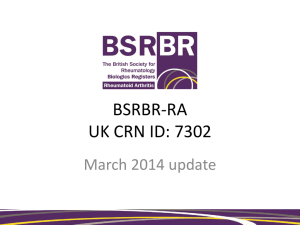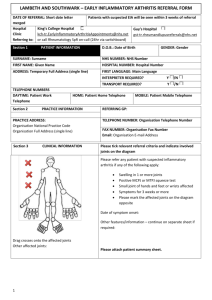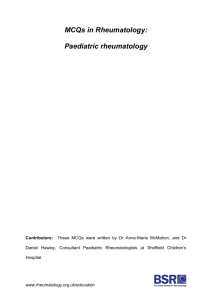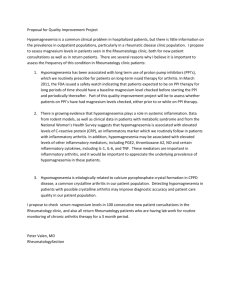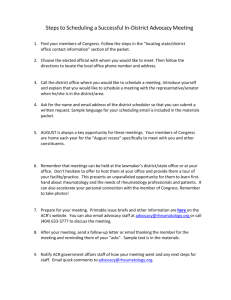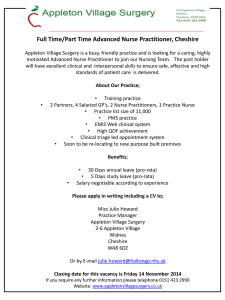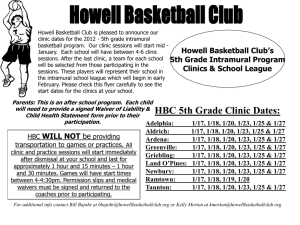RHEUMATOLOGY IN THE 21st CENTURY
advertisement
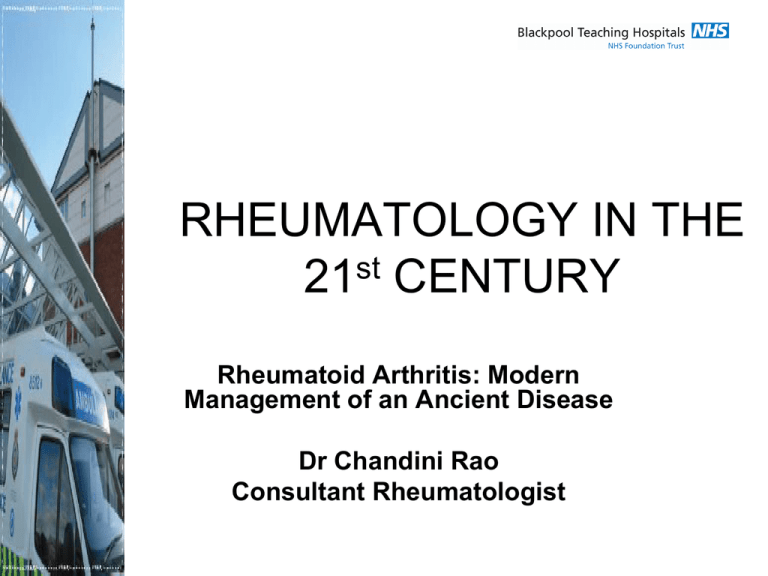
RHEUMATOLOGY IN THE 21st CENTURY Rheumatoid Arthritis: Modern Management of an Ancient Disease Dr Chandini Rao Consultant Rheumatologist History of Rheumatoid Arthritis (RA) • 123 AD first text describes symptoms very similar to RA • 1800 first recognised description of RA by French physician Dr A J LandréBeauvais (1772-1840) • 1859 name “rheumatoid arthritis" itself was coined by British Dr A B Garrod. 2 What is it? • Chronic, progressive, autoimmune disease • Causes inflammation in joints (especially hands, wrists, feet) • Systemic condition 3 What is inflammation? • Normal body defence mechanism • Increased blood flow • Blood cells produce chemical messengers to continue the process • Heat, swelling, redness, pain, loss of function 4 5 6 7 Who does it affect? • • • • • • • • 0.8% of UK population 3x more common in women Onset usually between ages 40 - 60 Approx 580,000 patients in UK 12,000 under age 16 26,000 new diagnoses/year NHS costs: £560 million/year Economy: £1.8 billion/year 8 What causes RA? • Genetics • Environment 9 Genetics • 1st degree relative: 2-7 fold risk • Identical twin: 16% chance of RA • Need an environmental trigger as well 10 Environment • • • • • Geography Hormones Infection Smoking Diet 11 12 Symptoms • • • • • • Joint pain Joint swelling Morning stiffness Fatigue Weight loss Flu-like symptoms 13 What else does RA do? • • • • Eyes: dryness, inflammation Lungs: fluid, inflammation, nodules Skin: nodules, ulcers Heart: fluid, inflammation, ischaemic heart disease • Blood: anaemia, low counts 14 How is RA treated? General Principles: • Patient education/self-management • Multi-professional team care • Medication • Surgery 15 Symptomatic Treatments • • • • • • • • • Education/support Rest/relaxation Joint protection Physiotherapy Painkillers Anti-inflammatory drugs Steroids Joint injections Pain Management Clinics 16 Reduction of Joint Damage Disease-modifying Anti-Rheumatic Drugs (DMARDS) Biologic drugs •Methotrexate •Sulfasalazine •Leflunomide •Hydroxychloroquine •Azathioprine •Ciclosporin •Gold •Penicillamine • Anti-TNF therapy: • • • Infliximab Etanercept Adalimumab Certolizumab Golimumab Rituximab Abatacept Tocilizumab 17 Goals of Therapy • To relieve pain, stiffness, swelling, fatigue • To prevent joint damage/disability • To improve quality of life • ? To achieve disease remission 18 Principles of Treatment • Early diagnosis • Early initiation of treatment • Regular assessment (Disease Activity Scores) • “Treat to Target” • Annual review 19 20 Famous people with RA • Dorothy Hodgkin: Nobel prize winning scientist, developed severe RA at age 28. Developed X-ray crystallography, discovered the structure of insulin and enabled discovery of the genetic code. • Christiaan Barnard: performed first heart transplant in 1967, 11 years after developing RA. Wrote a book on living with arthritis • Kathleen Turner: Hollywood actress • Bob Mortimer: British comedian 21 Pierre-Auguste Renior (1841-1919) • French, impressionist • 1892 RA – 51 yrs 22 23 24 25 26 Thank You! 27 RHEUMATOLOGY IN THE 21st CENTURY The role of the Rheumatology Nurse Practitioner. Janice Booth ABOUT ME • • • • • RGN (SRN) 1981 Rheumatology 1984 / Research / CNS BA Hons, Health and Psychology 2001 Nurse Practitioner, 2007 Non Medical Prescriber, 2009 Blackpool since December 2002. 29 THE MULTI DISCIPLINARY TEAM • • • • • • Consultants x 3 + 1 (SPR & SHO) Rheumatology Nurse practitioner Biologics Nurse practitioner Osteoporosis CNS Occupational Therapist Physiotherapist 30 CONDITIONS SEEN • • • • • Rheumatoid Arthritis Psoriatic Arthritis Ankylosing Spondylitis Lupus Polymyalgia Rheumatica 31 RHEUMATOLOGY NURSING • Moved from the bedside to the clinic • From Nurses as carers • To autonomous practitioners. • Higher education – extended roles and skills. 32 WHY???? • Face of Rheumatology has dramatically changed. • Focus on prevention of disease progression. • Maintaining function. 33 WHY? • From more conservative approach, To proactive management – treat to target. • Standards and Guidelines - direct practice. • Drug development, evidence based practice. 34 TREATMENT • Pharmacological. • Physical – Occupational Therapy / Physiotherapy. • Psychological. 35 DISEASE MANAGEMENT • Early intervention • Aggressive • Combination therapy (NICE, 2009. BSR,2006. 2009.) 36 Early RA 37 ADVANCED RA. 38 Psoriatic Arthritis 39 Role of Rheumatology Nurse • Educate. • Assess. • Monitor. Concordance with treatment improves outcomes. 40 REFERRALS • Members of the MDT • Primary care – GP, Practice Nurses, Community Matron • Patients – helpline or monitoring clinic 41 Reasons for referral • New Diagnosis • New treatment / DMARD • Treatment efficacy – titration / escalation • Biologic therapies • Interim follow ups • S.O.S – urgent clinic • Rheumatology Monitoring Clinic 42 Nurse Practitioner Assessment • Review medication / concordance. • Monitoring. • Disease Activity. • Education / counselling. • Treatment plan / Recommendations / Interventions / referral. 43 SERVICE • Nurse Led Clinics – Clifton and Fleetwood • MDT Clinic – Clifton (2 x month) • Rheumatology Monitoring Clinic – BVH weekly with OPD 44 Service Cont. • S.O.S clinic – Clifton (2 x month) • Helpline • Education – Pt Groups, Staff, Students • NRAS group (BADRAG) http://www.badrag.org.uk/index.html 45 ACTIVITY • Nurse Led Clinics - Mon, Tues and Weds approx 25 appointment slots per week. Activity for 2010 = >1000 (1100 apps face to face contacts. (Data 2004 = 722) • Helpline – 988 calls. • Monitoring Clinic – 43 slots (28 injection+ 15 bloods). 46 SERVICE DEVELOPMENT • Implementation of NICE – 79 • Early arthritis clinics • Annual review clinics • I/A injection (nurse led) • S/C Methotrexate - Community 47 THANK YOU Any Questions? 48 The next Members health seminar will take place on:Thursday, September 22nd 2011 12 -1 pm in the Lecture Theatre, Education Centre, BVH The topic is: “Bereavement across Lancashire and South Cumbria.” 49
